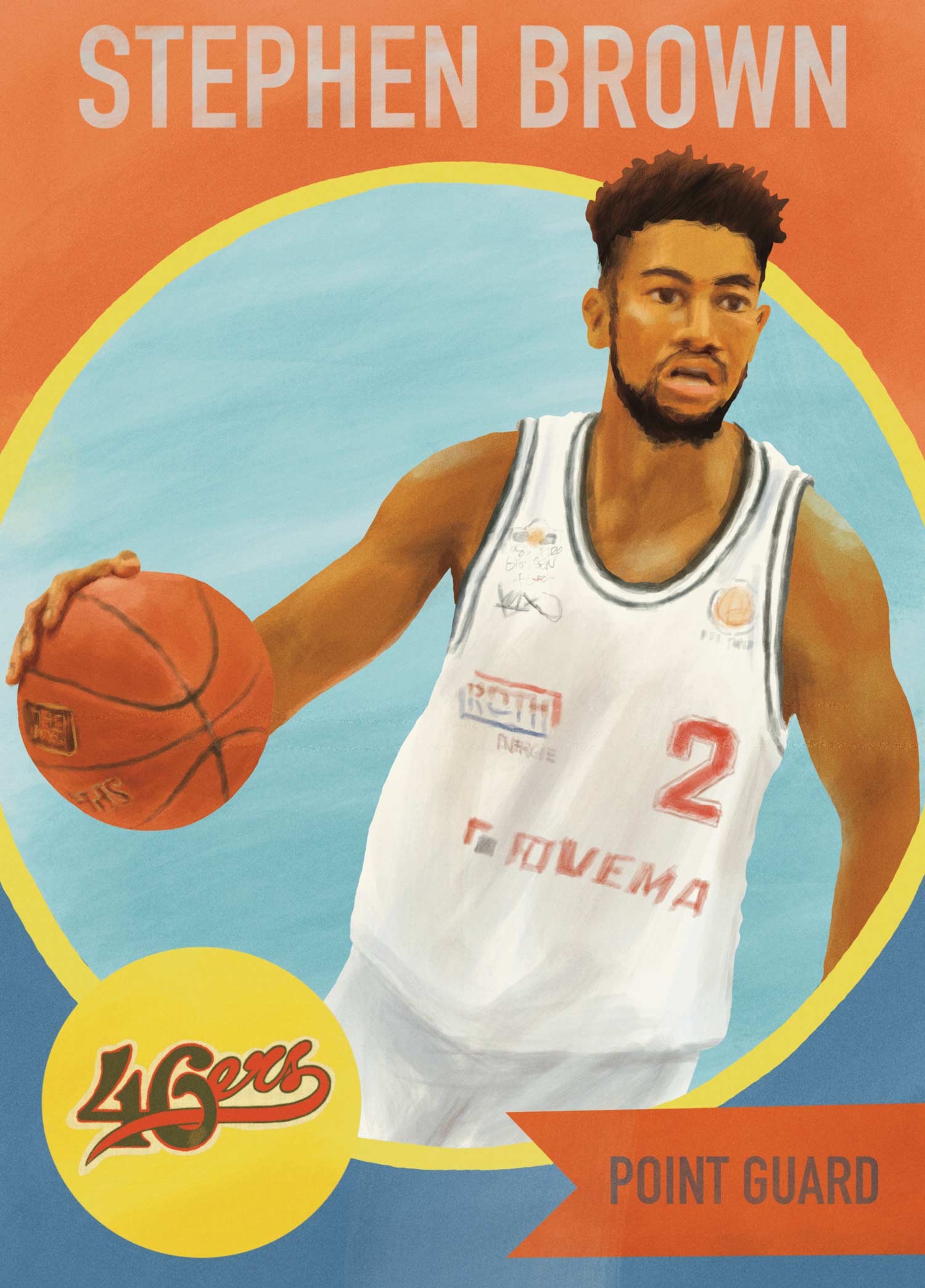

by David Driver
illustration by Jane Brooks

t was just a simple comment at a routine basketball practice her junior year, but it led Suné Swart ’17’s mind on a transatlantic flight. That day, then-assistant coach Martina Wood “told me I had the perfect body type to play overseas,” says Swart, a 6-foot-3-inch center. Swart took the remark seriously, as Wood had played college ball at powerhouse North Carolina and for pro teams in Europe and the Middle East.
After graduating with a computer science degree, Swart headed for Spain, where she’s now in her fourth season with a pro women’s basketball league. In Ferrol, a city of about 66,000 near the Atlantic Ocean in the country’s northwest, she shares an apartment with two American teammates.
Swart is just one of several recent Bucknell graduates adjusting to new cultures while living out their pro dreams overseas.
Kaitlyn Slagus ’19 played in Ireland in 2019-20, while Stephen Brown ’18 now plays for a club in France and Nana Foulland ’18 competes for a team in Italy. Other Bison stars have also trod the international courts in recent years: Zach Thomas ’18 (Ukraine in 2019-20), Cameron Ayers ’14 (Poland in 2019-20) and Kimbal Mackenzie ’19 (Spain in 2019-20).
“When you’re the American [player], you are expected to do it all,” says Slagus, now the head girls’ coach at her alma mater, Belle Vernon High near Pittsburgh. “At times it was a lot of pressure. But my Bucknell coach [Wood] told me, ‘You always played with pressure.’ I was the biggest girl on the team in terms of height.”
Slagus moved overseas through the Victory Scholarship program of the Sports Changes Life Foundation, which sends American athletes to Ireland and Northern Ireland to refine their game while studying and serving as community ambassadors. Even though she was a pro athlete and an American, she wasn’t treated like a celebrity in her small Irish town. Attendance was sparse at most home games, and there were other Americans studying at the local university.
Adjusting to the customs of a foreign country had its challenges. “Everyone is so eco-friendly over there. You get charged for everything,” including sugar packets in restaurants. “It was a culture shock,” she says, adding that a more positive aspect of life was the prevalence of public transportation, which made owning a car unnecessary.
Some of Europe’s top leagues are in the west, including in Spain, France and Italy, while Russia is also competitive. Foulland played in Israel, Romania and Poland before winding up in the second-best league in Italy this winter. A 6-foot-10-inch center from New York City, he says he felt the pressure to perform well at every step of his career. “Every mistake made in the pros will be costly,” he says.
But Foulland took the extra attention in stride. No matter where he’s been, he tends to stand out in a crowd.
“In some cities in some countries, everyone knows you when you go out,” he says. “In other places, you blend in, although it’s hard to do so anywhere in the world at 6-10.”
The level of interest in his team has also varied from country to country and city to city, depending on the place, the team and its history, says Foulland, who majored in history and minored in education.
Brown agrees that the recognition players enjoy depends on the location.
“As an American basketball player, your status depends on how involved the fans are with basketball in the city in general,” Brown says. “I’ve been on some teams where the basketball teams were well known and some where basketball doesn’t seem to even exist.”
Slagus played in Ireland’s Women’s Super League with IT Carlow BC in Carlow, about 50 miles from the capital of Dublin. While there, the Pennsylvania native pursued a graduate degree and helped coach two youth boys’ basketball teams.
She was one of two Americans on her team, which normally played just one game a week, typically before a crowd of fewer than 100 people — during Slagus’ time as a Bison more spectators attended games in Sojka Pavillion and at her squad’s two NCAA Tournament appearances. The scant attendance didn’t affect her game, however, as she averaged nearly 23 points, 17 rebounds and three assists per game and was named the eurobasket.com Irish league defensive player of the year.
It was not the first European journey for Slagus, who visited Ireland on a family vacation as a teenager. With the Bison she also visited Europe during summer 2018 and played an exhibition game in the Czech Republic.
B. A pro player with a Spanish team, Suné Swart ’17 drives for a layup.
C. Nana Foulland ’18 on a promotional poster in Sopot, Poland.
Brown, a 5-foot-11-inch guard from Virginia, played in Turkey, Latvia, Russia, Germany and England before signing with a team in Denain, in northern France, this season. “I enjoy away games the most because they provide the opportunity to visit and see other cities throughout the country,” says the psychology major and religious studies minor.
The chance to play in England while fulfilling a short-term contract in October allowed Brown to “tour around London and see all the famous and notable landmarks.” As his career has taken him around the continent he’s frequently had the feeling of wanting to pinch himself as a reminder that he’s really there. “While walking around and taking pictures, I just became even more grateful that I am living out my dreams,” he says.
His time in Europe has also given him a different perspective on world events and developments back home, like observing the protests following George Floyd’s murder in Minneapolis spill over into European streets and capitals.
“I thought the Black Lives Matter protests were very powerful,” says Brown, who was moved to see people in Germany and France “coming together and being heard. People are starting to become more aware and checking biases that they never realized they had. While in France, I’ve been asked a few times about the issues in the U.S., such as the political climate and racial injustice.”
Living in Spain was not Swart’s first experience adjusting to a new environment. Born in South Africa, she moved to Minnesota at age 11. The family eventually settled in Oil City, Pa., where her late father was a pastor.
“Europe is so different from South Africa and also from America, too,” she says. “I was in awe of the old buildings, and the city centers [in Europe] are very cool. People are able to walk everywhere, from café to café to café. I think I had culture shock at first, but I am kind of used to that now.”
European leagues welcome players from American colleges because they offer top competition and an opportunity for a country’s native players to build their skill level, but the leagues also limit how many former American players they accept. By restricting the number of foreign players, European teams can help build the game of basketball with players from their own nations.
Despite her exclusive status, that doesn’t mean Swart enjoys the recognition level a player like the WNBA’s Maya Moore enjoys at home.
Playing overseas “is not like being a celebrity in terms of your personality,” Swart says. “If people see your jersey, they know you are part of the team. If you walk somewhere and you are tall, the fans will say, ‘Good job.’ It is kind of like Bucknell.”